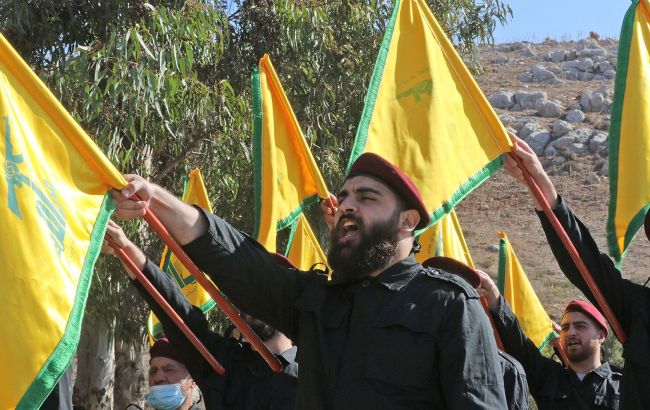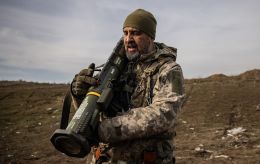Hezbollah considers Israel-US ceasefire proposal - CNN
 Photo: Hezbollah leadership considers a Western peace proposal (Getty Images)
Photo: Hezbollah leadership considers a Western peace proposal (Getty Images)
Hezbollah, the Lebanese Islamic group, is considering a ceasefire proposal from the United States and Israel. This signals a shift in diplomatic efforts to end the conflict in the Middle East, according to CNN.
A Lebanese official familiar with the negotiations stated that on Thursday evening, November 14, the US Ambassador to Lebanon, Lisa Johnson, presented the proposal to the Lebanese government.
The government is optimistic about Hezbollah's potential agreement to the terms and expects an official response to the latest proposal by next Monday.
“Diplomatic efforts are on fire now,” the source said.
On Saturday evening, November 16, another Lebanese source informed CNN that political figures in Beirut are holding wide-ranging discussions about the American initiative.
The latest proposal, presented by Ambassador Johnson to Nabih Berri, a speaker close to Hezbollah, marks the first offer from the US and Israel following negotiations in late September aimed at a temporary ceasefire. Those efforts collapsed when Israel eliminated Hezbollah leader Hassan Nasrallah in a major strike on southern Beirut.
The essence of the peace proposal
Two individuals involved in the negotiations told CNN that the main issue is how to force Hezbollah to withdraw from southern Lebanon and whether the Lebanese Armed Forces would be willing to take a more active role in the situation.
According to one Lebanese official, the US-Israeli proposal aims to achieve a 60-day cessation of hostilities and is presented as a basis for a long-term ceasefire. He added that the timeline aligns with the parameters of UN Resolution 1701, which ended the 2006 Lebanon-Israel war. The resolution stipulates that the only armed groups south of the Litani River should be the Lebanese army and UN peacekeeping forces.
The proposal also calls for Israeli ground forces, which have operated in southern Lebanon since late September, to withdraw to the internationally recognized border between the two countries.
“The points mainly focus on the mechanism of implementation and on the role of the Lebanese Armed Forces in implementing 1701 in the south of the Litani River,” the official said, adding that it also addresses smuggling routes across the country’s international borders.
US interest and Trump factor
One Lebanese official familiar with the ceasefire negotiations told CNN that newly elected US President Donald Trump has supported the talks led by President Biden's special envoy to Lebanon, Amos Hochstein.
According to American and Israeli sources, US officials continue to push for a ceasefire agreement between Israel and Hezbollah in Lebanon. Close associates of Trump have signaled to Biden's administration that he will not attempt to derail the ongoing efforts.
Questions remain about when the deal will be finalized. Current US officials say it is close to completion. Still, some Israeli officials have told Trump’s team that they intend to deliver the ceasefire to the new administration as an early gift. Other Israeli officials have made it clear to the Biden administration that they wish to conclude the agreement as quickly as possible.
The so-called Logan Act prohibits the election winner from engaging in US foreign policy, including negotiating with foreign governments involved in disputes with the US, until they are officially inaugurated. Trump’s transition team has been informed about this law.
However, some current US officials note that Trump likely does not want to be seen as pressuring Tel Aviv so soon after taking office. Thus, there is a mutual incentive to resolve the situation on Israel’s northern border as soon as possible.
Escalation in the Middle East
Israel launched a major offensive in Lebanon in mid-September after months of border skirmishes involving Hezbollah. These escalated after Hezbollah repeatedly shelled Israeli territory in solidarity with Hamas and Palestinians in the Gaza Strip. A key political imperative for the Israeli government has been to return 60,000 civilians to their homes in northern Israel.
The IDF's offensive has caused devastating damage to Hezbollah's leadership and its massive arsenal. According to the Lebanese Ministry of Health, hundreds of civilians were killed during the military operation, and more than a million people were displaced.
Even as ceasefire talks continue, Israeli airstrikes this week have intensified, ramping up bombing and ground operations. Most targets are in Shiite-majority areas where Hezbollah holds sway. However, Israel is also hitting buildings where displaced families are living, far beyond Hezbollah-controlled zones.
Additionally, this week, IDF announced a major withdrawal of weapons, rockets, and launchers from southern Lebanon. This move follows a reduction in Hezbollah's military capacity in the region.

